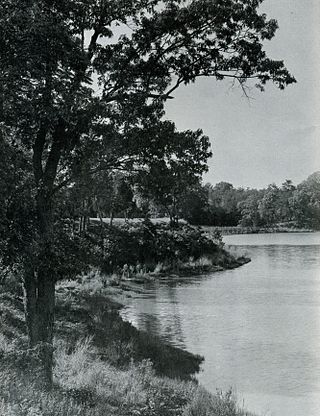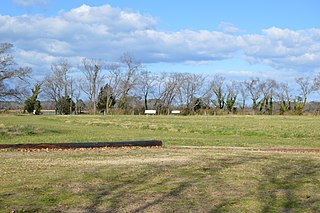
Brunswick County is a United States county located on the southern border of the Commonwealth of Virginia. This rural county is known as one of the claimants to be the namesake of Brunswick stew. Brunswick County was created in 1720 from parts of Prince George, Surry and Isle of Wight counties. The county was named for the former Duchy of Brunswick-Lunenburg, which was a British possession in the 18th century. As of the 2020 census, the county population was 15,849. The Brunswick county seat is Lawrenceville.
Sir George Yeardley was a planter and colonial governor of the colony of Virginia. He was also among the first slaveowners in Colonial America. A survivor of the Virginia Company of London's ill-fated Third Supply Mission, whose flagship, the Sea Venture, was shipwrecked on Bermuda for ten months from 1609 to 1610, he is best remembered for presiding over the initial session of the first representative legislative body in Virginia in 1619. With representatives from throughout the settled portion of the colony, the group became known as the House of Burgesses. It has met continuously since, and is known in modern times as the Virginia General Assembly. Yeardley died in 1627.
Thomas Rolfe was the only child of Pocahontas and her English husband, John Rolfe. His maternal grandfather was Chief Powhatan, the leader of the Powhatan tribe in Virginia.

Thomas Fairfax, 6th Lord Fairfax of Cameron, was a Scottish peer. He was the son of Thomas Fairfax, 5th Lord Fairfax of Cameron, and Catherine Colepeper, daughter of Thomas Colepeper, 2nd Baron Colepeper.

Colonel Robert Carter I was a planter, merchant, and government official and administrator who served as Acting Governor of Virginia, Speaker of the Virginia House of Burgesses, and President of the Virginia Governor’s Council. An agent for the Northern Neck Proprietary, Carter emerged as the wealthiest Virginia colonist and received the sobriquet “King” from his contemporaries connoting his autocratic approach and political influence. Involved in the founding of the College of William and Mary, he acquired at least 300,000 acres and engaged one thousand enslaved laborers on fifty plantations.

Quicksand is an unincorporated community located in Breathitt County, Kentucky, United States. This small community is along the North Fork of the Kentucky River, directly across the river from where Quicksand Creek flows into the river. For over 200 years, Quicksand has been well known as "where the Back's live," a very prolific family who were the first settlers to arrive there, in 1791. The family's surname is now spelled, both as "Back" and as "Bach." The family's long, historical association with Quicksand has been documented in many books, including "The Kentucky" by Dr. Thomas D. Clark, and "In the Land of Breathitt" by the Kentucky Writer's Project.

The Blackwater River of southeastern Virginia flows from its source near the city of Petersburg, Virginia for about 105 miles (170 km) through the Inner Coastal Plain region of Virginia. The Blackwater joins the Nottoway River to form the Chowan River, which empties into Albemarle Sound. The Blackwater-Nottoway confluence forms the boundary between Virginia and North Carolina.

Edmund Jenings (1659-1727) was a British politician and lawyer who held important posts in the Colony of Virginia including as the attorney general, on the Governor's Council and as acting governor, but encountered controversy and experienced financial problems in his final years.

The Nottoway are an Iroquoian Native American tribe in Virginia. The Nottoway spoke a Nottoway language in the Iroquoian language family.

Popes Creek is a small tidal tributary stream of the Potomac River in Westmoreland County, Virginia. The George Washington Birthplace National Monument lies adjacent to Popes Creek estuary.
Captain Thomas Harwood emigrated from Britain and became a soldier, landowner and politician in the Colony of Virginia. He founded a family which like him for generations often represented the area now known as Newport News, but which in his day was known as Mulberry Island, and later Warwick River and still later Warwick County. Despite coming into conflict with royal governor Sir John Harvey in 1635, and a gap in legislative service, Harwood became the 5th speaker of the House of Burgesses.
Temperance Flowerdew, Lady Yeardley was an early settler of the Jamestown Colony and a key member of the Flowerdew family, significant participants in the history of Jamestown. Temperance Flowerdew was wife of two Governors of Virginia, sister of another early colonist, aunt to a representative at the first General Assembly and "cousin-german" to the Secretary to the Colony.
Henry Bowman (1814–1883) was an English church architect and architectural historian.
Thomas Batts was an early settler in Virginia and an explorer of western Virginia.
Colonel Lemuel Mason was an early Virginia planter, politician, justice of the peace, and militia colonel, who represented Lower Norfolk County in the House of Burgesses intermittently over three decades.
Colonel William Tayloe was an English-American immigrant, colonist and planter, from Gloucester, England, who emigrated to the British Colony of Virginia and resided in York County. His coat of arms, Vert a sword erect Or between two lions rampant addorsed Ermine, matches those of the Teylow families in Gloucester, England.

Gabriel Jacobs, born about 1650, was the progenitor of the Jacobs family of free African Americans originating in Northampton County, Virginia. A number of his descendants migrated south in the mid-1700s, primarily to southeastern North Carolina. His story and that of his descendants is representative of the experiences of hundreds of other freedmen originating in early southern American colonies.
William Browne emigrated from Surrey, England to become a major planter and politician in the Colony of Virginia. He lived on the south bank of the James River at now-historic Four Mile Tree plantation, named for its distance from Jamestown and which in his tenure became part of Surry County. While his lawyer son, also William Browne, held only county offices, his grandson, also William Browne, would become a patriot in the American Revolutionary War, and serve in the Virginia House of Delegates.
David Mason was a Virginia planter and politician in Sussex County who represented the county for more than two decades in the House of Burgesses, then became a prominent patriot during the American Revolutionary War, serving in all five Revolutionary Conventions as well as Colonel of the 15th Virginia Regiment of the Virginia Line of the Continental Army, and later briefly served in the Virginia Senate and Virginia House of Delegates.
Thomas Mathew was an English merchant who became a planter and politician in the Colony of Virginia. He owned property in Northumberland County and was one of the first burgesses representing Stafford County in the House of Burgesses when it was formed. An Indian raid which killed one of his herdsmen was a precursor of Bacon's Rebellion and shortly before his death in London Mathew wrote an account of that conflict which was published a century later.













